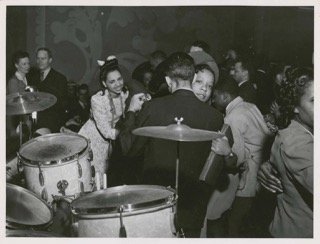Tems and The State of Black Music
Photo from Nataal.com
Black music, music by and for Black people, has always represented release, resistance, and community for the Black community. Living under an anti-black society, music has allowed Black people to express not just their artistic creativity but also allowed Black people to express their longing for freedom.
During slavery, the enslaved Black people used Negro spirituals like Wade in the Water, Swing Low Sweet Chariot, and "Joy-bells" is ringing in my soul. Many Black Churches, especially those in the South, still hold on to songs like these to preserve the history and legacy of the Black gospel. In the antebellum period, music represented a secret code to escape, a call to freedom, a longing for something further, and an expression of pain and sorrow. Black music during this time was used to hide secret messages to help the enslaved escape and was also used to preserve Black oral history. With the end of formal slavery, Black music genres became to take root as Black people began to come back from the civil war there was an influx in white terrorism. This gross display of violence led to the creation of two genres Jazz and Blues, both of which articulate the poverty, grief, and frustration that the Black community faces at this time. After the great depression, we saw the creation and cultivation of Delta Blues, Jazz, Folk, and Swing music from artists like Billie Holliday, Muddy Waters, John Coltrane, and B.B. King. The music industry also began to abuse many of these Black artists through the promotion of substance abuse problems, media industry corruption, and overall exploitation. These skewed life chances are emblematic of life within the afterlife of slavery. Black bodies even celebrities still feel the tole of anti-blackness regardless of the spaces that they occupy. Black music continues to follow along with Black tradition subverting the gratuitous violence that impacts Black people and even providing a means for healing and community for the Black people navigating this white supremacist hetero-normative patriarchal capitalist society.
Contemporarily, Black music has multiplied its impact and Black artists can be seen across every genre. The evolution of Black music has cultural roots throughout the African diaspora from the continent to the Caribbean. Many of our modern-day favorite genres stem from the legacies of Jazz like Afro-beats and R&B for example. Modern afro-beats are the culmination of artists like Toni Allen and Fela Kuti, Nigerian artists considered the pioneers of Afro-beats.
In rising Afro-beat icon, Tems’s debut EP For Broken Ears she pairs her emotional singing with tranquil beats to express the pain and release she gets surrounding issues of love, healing, and pain.
Tems combines the pain and pleasure of rhythm and blues with afro-beat creating a hybrid of past and futureAfrican culture. Hip-Hop has always possessed this hybridity of Black music. Hip-Hop today has stretched across the globe hitting Latin America, Europe, and Africa creating new blends like London Drill. Similar to slavery, Hip-Hop encodes messages of struggle and poverty behind beats that range from enraging to peaceful. Black artists have utilized music in a way that has allowed for Black music to remain in constant conversation with Africa, the Caribbean, and all parts of the diaspora. Black music remains in conversation with the content of Africa no matter the movement of time and geography.



